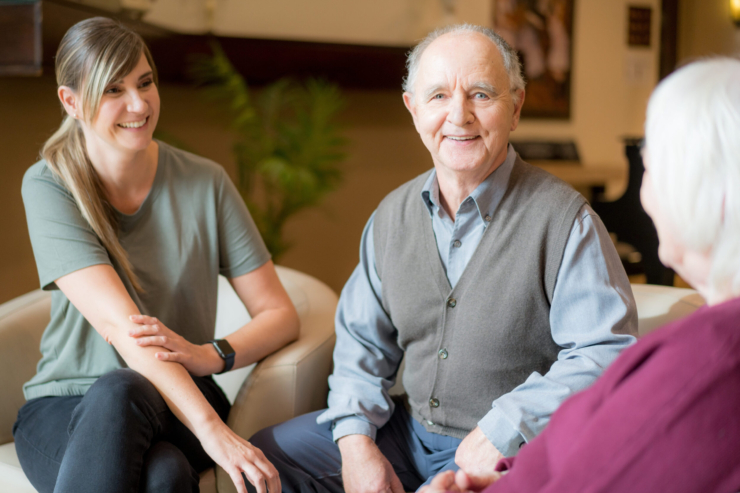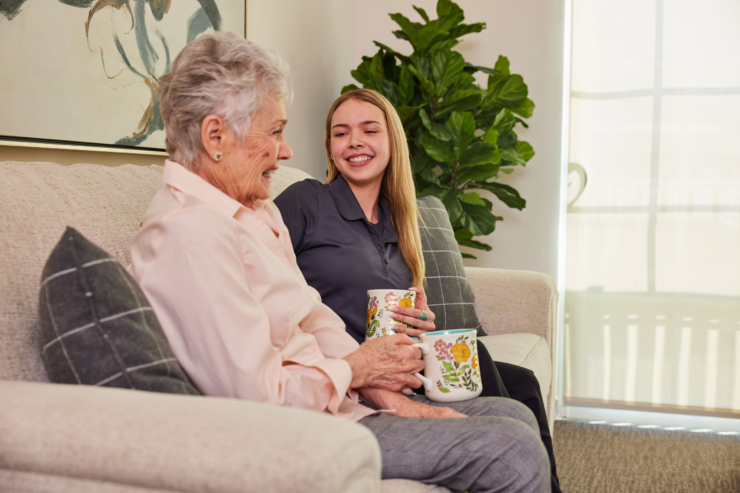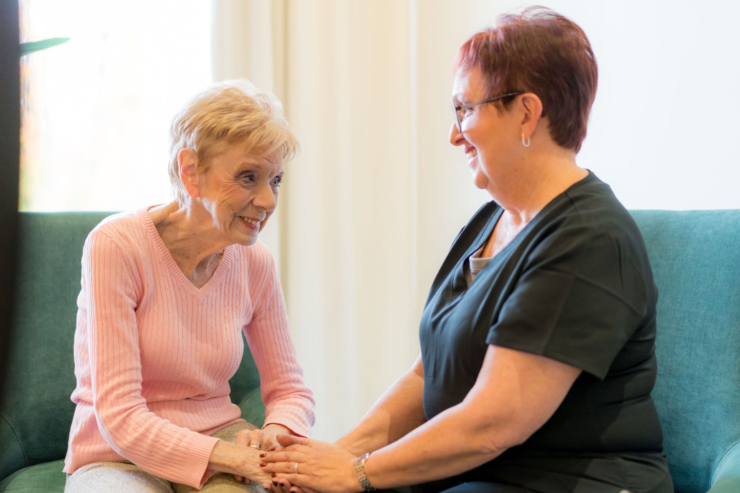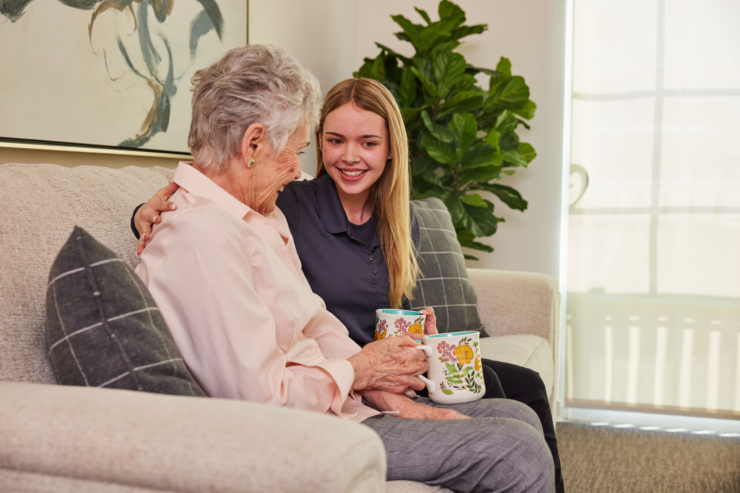
Essential self-care strategies for Dementia caregivers
Dementia is no ordinary condition. It’s complex, challenging, and lacks a cure. An estimated 57 million individuals are affected by dementia worldwide. While we often focus on those individuals, dementia also profoundly impacts their families and friends. Immediate family members often become Alzheimer’s volunteers, caring for a parent with dementia at home. This blog will provide practical advice for caregivers, offer help for Alzheimer’s families, and explain resources that supply support for Alzheimer’s families.
Caring for a parent with dementia at home may seem daunting, but it offers a unique opportunity to do real good in the world. Many caregivers say they grow closer with their family and faith. In fact, when self-care is balanced, caregiving can be incredibly rewarding.
Alzheimer’s Family: The Emotional Impact of Caring for a Parent with Dementia at Home
Jack Wesolowski is a person living with dementia (PLWD). And like many people living with dementia, his caregiving needs fall upon his immediate family. Mike is the second born of his five children and is physically the closest. He knows that Jack can no longer live alone in his home. So, he moves Grandpa Jack into his house.
Caring for a parent with dementia at home requires a significant readjustment of priorities. Mike and his wife, Kalya, choose to take time away from their children, social lives, and jobs to be caregivers.
Suddenly becoming caregivers for a dementia patient at home can cause a wide range of feelings. For example, according to surveys, 50% of dementia caregivers feel lonely as a result of their new responsibilities. That same study reported that 61% of dementia caregivers need more support for Alzheimer’s families.
In this example, sibling relationships can become strained, especially when the dementia caregiver’s responsibilities are not evenly distributed. But Mike’s siblings are scattered across the country.
Everyone reacts differently to their new responsibilities. Feeling any combination of discouragement, sadness, frustration, confusion, or anger is completely natural and okay. It’s also normal for dementia caregivers to not know what they are feeling. But there is hope. One study found that up to 90% of dementia caregivers had positive experiences from deepening bonds, sharing activities, growing personally, and spending more time with their loved ones.
Managing the emotions that come with coping with a loved one’s dementia involves finding peace and balance in an uncontrollable situation. Care communities and experienced staff in senior care homes recommend caregivers prioritize a healthy diet and exercise routine, even though it can be challenging. These habits naturally help our bodies and minds manage stress. Additionally, spiritual practices like religion, prayer, meditation, and other outlets can offer valuable community support.
Help for Alzheimer’s Families: Building a Support Network for Dementia Caregivers
Dementia caregivers and Alzheimer’s volunteers should never feel guilty about asking for help or taking time for themselves. In fact, sharing responsibilities, where appropriate, can minimize stress. You don’t have to do everything yourself. Calling upon friends, family, and even professionals— in other words, creating a support network— is a huge help for Alzheimer’s families.
This Alzheimer’s family relies on Mike’s siblings for support. Mike’s sister, Amanda, frequently travels for work and can visit Mike for weeks at a time. Amanda gives Mike and Kayla much-needed breaks, creating time for self-care. Since Amanda is also an Alzheimer’s volunteer, she understands Kayle and Mike’s challenges and responds with loving support.
Kayla and Mike have three children: two are in high school, and the oldest is in college. As part of the adjustment, they clearly and honestly explained the situation. Understanding the weight of an Alzheimer’s family, the kids share more responsibilities. Cooper, the oldest, visits home more often to support his parents emotionally. The middle child, Alex, helps out with cooking and cleaning. The youngest, Aubrey, keeps Grandpa occupied with photo albums and games. With a consistent routine, these photos and games help Grandpa Jack with his Alzheimer’s memories. Aubrey and Alex share household chores and help each other when needed. These responsibilities are not directly related to the PLWD, but sharing chores lessens the stress on our Alzheimer’s family.
After some adjustment, this change proves to be beneficial to everyone. Spending time with Grandpa Jack brings the family closer together. Alex enjoys experimenting with all sorts of culinary creations. Aubrey is inspired by all the adventures Grandpa Jack achieved throughout his life. Amanda and Mike strengthen their relationship. To top it all off, they have weekly family game nights. While caring for a parent with dementia at home can feel like climbing a mountain, there is a beautiful view waiting for you at the top.
Senior Living Care Communities Offer Support for Alzheimer’s Families and Dementia Caregivers
Family is often the backbone of a support network. However, many retirement communities, senior living communities, and senior care homes host support groups.
For example, Cogir Senior Living retirement communities host dementia caregiver support groups. They are led by an experienced leader who can give recommendations and coping strategies. Kayla and Mike visited a group, trusting Amanda to care for Jack. They learn some new strategies, but more importantly, they connect with other caregivers supporting a loved one with dementia. There are a lot of families caring for a parent with dementia at home. Kayla and Mike don’t feel so alone anymore. These support groups for Alzheimer’s families foster an encouraging community.
Expressing your feelings, challenges, and success in a supportive, judgment-free group is a form of self-care. You’re letting your feelings out instead of bottling them up.
Religious communities can also be part of a support network, depending on the Alzheimer’s Family. Some caregivers find that attending church, temple, or mosque helps them in the long term. Many retirement communities host religious services and faith-based groups.
Help for Dementia Caregivers: Prioritizing Your Own Health
No one is perfect, and all caregivers need to recognize their limits. Sometimes, the best Alzheimer’s help for caregivers is respite care. Respite caregivers are professionals who can assume responsibilities from a primary caregiver, whether for a few hours or several weeks. Respite care prevents burnout, giving you time to prioritize your own health and self-care.
It’s essential to take time for yourself. Neglecting your own well-being only makes caregiving more difficult. Incorporate regular exercise into your routine, even if it’s just a 10-20 minute walk—some exercise is better than none.
Prioritize adequate sleep, as it supports all aspects of your day. Regular exercise can help with that. However, so can establishing a consistent sleep schedule. Create a relaxing bedtime routine, such as reading a book, limiting screen time, or stretching 30 minutes before bed.
Don’t forget to attend regular doctor appointments, as many caregivers fall behind on their own health needs. Try to stay connected with friends and family.
For mental health, set realistic goals and expectations. Don’t expect to memorize the seven stages of dementia overnight. Practice stress-reduction techniques such as meditation, deep breathing, or mindfulness.
Deep Breathing Techniques to Help You Quickly Destress
4-7-8 Breathing:
- Inhale through your nose for 4 seconds
- Hold your breath for 7 seconds
- Exhale through your mouth for 8 seconds
- Repeat 4 times or as needed to destress.
Box Breathing:
- Inhale for 4 seconds
- Hold for 4 seconds
- Exhale for 4 seconds
- Hold for 4 seconds
- This seemingly simple breathing technique is the basis for many meditation practices. Try this for 5-10 minutes. Let your thoughts drift out of your mind without judgment, like leaves on a stream.
Mindfulness Exercises to Keep You Grounded
Body Scan Meditation:
- Get comfortable, sit cross-legged, or lie down.
- Close your eyes and slow your thoughts. Let your thoughts drift by without judgment.
- Gradually shift your attention to different body parts, from toes to head.
- Notice sensations without judgment. What are your toes feeling? Sore? Numb? What are your feet feeling? Tired? Achy? Refreshed?
- The goal is to “get inside your body” without overthinking your sensations. This meditation can take anywhere from 10-20 minutes.
Five Senses Exercise:
- Pause, slow your thoughts, and notice:
- 5 things you can see
- 4 things you can touch
- 3 things you can hear
- 2 things you can smell
- 1 thing you can taste
If nothing seems to work and everything is just getting worse, consider professional counseling or therapy. It helps dementia caregivers to remind themselves why. Maybe your caregiving is done out of love, loyalty, a sense of duty, religious obligation, or something else.
Celebrate small victories and moments of joy. Instead of self-criticism, practice self-compassion. The key to succeeding as a dementia caregiver is finding balance in what you can control and making peace with what you cannot.
Extra Resources: Help for Alzheimer’s Families
Sometimes you just need some extra help to make sure you have time for self-care. Eldercare Locator is an online tool that shows you what’s available in your area. For example, you can quickly find dementia daycare centers.
Medicare, Medicaid, and some private health insurance plans may cover some of the costs. However, All-Inclusive Care for the Elderly (PACE) can also help cover medical care, social services, and long-term care. Unfortunately, it is not available in all states.
Local chapters of the Alzheimer’s Association offer in-person and online support groups for sharing experiences, tips, and social support. The Alzheimer’s Association also provides a free 24/7 helpline (800-272-3900). You can speak with specialists for support and advice.
ALZConnected, Memory People, Caring For Elderly Parents, and Caregiver Forum are all online communities where caregivers can connect, share experiences, and seek advice.
You Are Not Alone in This Journey
There are millions of families going through the same journey. By taking time to practice critical self-care, we can better prepare ourselves to navigate the future.
But there’s a bright light at the end of the tunnel! Caregiving deepens bonds, helps us grow personally, and strengthens us spiritually.
If you or someone you know is caring for a loved one with dementia, consider joining a support group and seeking professional advice. Visit our website for more information and support options available to you.
About Cogir Senior Living
What sets Cogir apart is the company’s devoted approach to creating healthy, vibrant communities that offer residents exceptional independent living, assisted living, and memory care lifestyle options. Cogir Senior Living develops, owns, and/or operates 80+ lifestyle communities throughout the United States.
Related News

Memory care costs explained: what you’re really paying for
Paying for memory care can feel overwhelming, but it’s crucial for families seeking the best support…

Looking for memory care? you should ask these questions
Living with dementia can be just as difficult for a caregiver as it is for the affected senior — maybe…

What is memory care and how can it help seniors with Dementia?
Watching a loved one struggle with memory loss can be heart-wrenching. Whether it’s due to Alzheimer…
